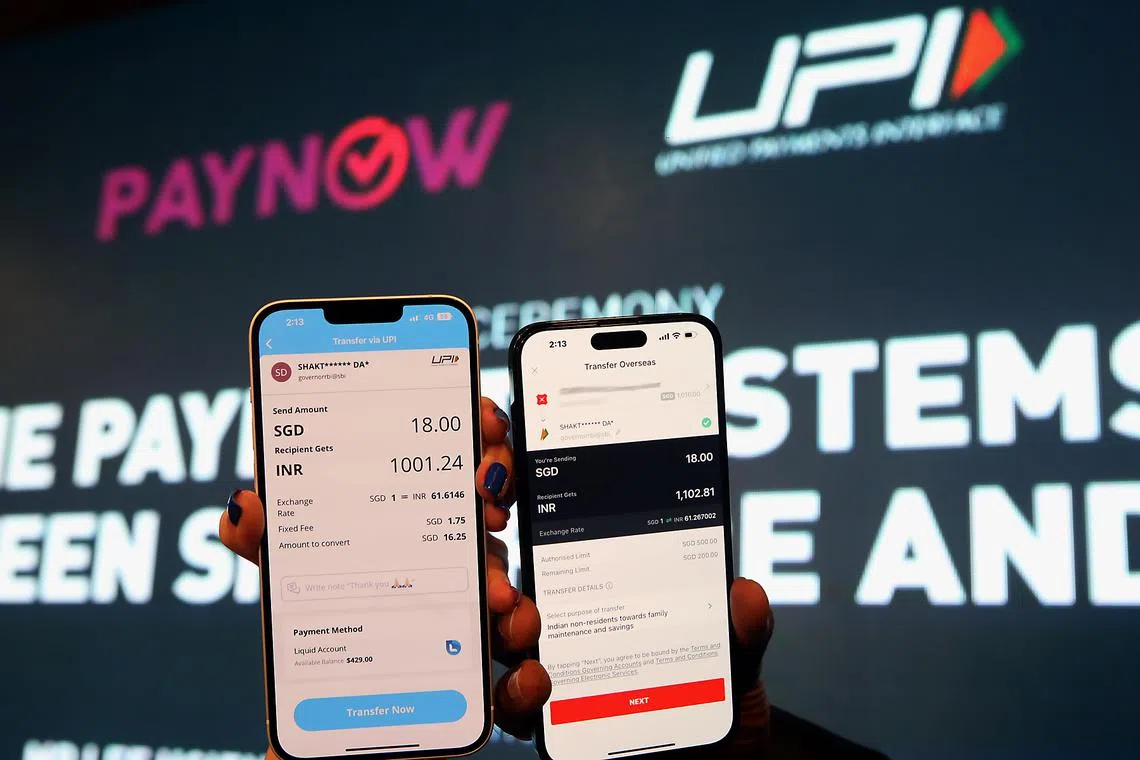PayNow links up with India’s UPI, enabling real-time payments between Singapore and India

INDIVIDUALS in Singapore and India will now be able to send real-time payments to one another through a service that links the Republic’s PayNow with India’s Unified Payments Interface (UPI).
The Monetary Authority of Singapore (MAS) and the Reserve Bank of India (RBI) on Tuesday (Feb 21) launched the PayNow-UPI linkage, allowing customers of participating financial institutions to send and receive funds between bank accounts or e-wallets across the two countries in real time.
This can be done using a mobile phone number, UPI identity or Virtual Payment Address, offering customers a “safe, simple and cost-effective” way to make cross-border fund transfers, MAS said in a statement.
In Singapore, the service will be available for customers from DBS and fintech firm Liquid Group.
Participating banks in India are Axis Bank, DBS India, ICICI Bank, Indian Bank, Indian Overseas Bank and State Bank of India.
Singapore Prime Minister Lee Hsien Loong and India Prime Minister Narendra Modi officiated the launch in a hybrid event on Tuesday.
Navigate Asia in
a new global order
Get the insights delivered to your inbox.
Speaking virtually at the launch, PM Lee said the idea to link PayNow and UPI was first conceived in 2018, during Modi’s visit to Singapore.
“Since then, our two central banks have been working on this in earnest, and digital connectivity was also a key topic discussed at the inaugural India-Singapore Ministerial Roundtable, which was held in New Delhi last September,” said PM Lee.
“So I am very glad that the PayNow-UPI linkage has now become a reality.”
Cross-border retail payments and remittances between Singapore and India amount to over US$1 billion annually, he noted.
The prime minister said he hopes this strong partnership between Singapore and India will continue to spawn innovative technology solutions and create more cross-border opportunities for both countries’ digital economies.
Modi said through an interpreter that the facility will especially benefit migrant workers, professionals, students and their families.
He noted that UPI has become the “most preferred” payment mechanism in India, with experts estimating that digital wallet transactions will “very soon” overtake cash ones.
Last year, UPI handled 74 billion transactions amounting to more than 126 trillion rupees (S$2 trillion), he added.
“What is really wonderful is that today, UPI is enhancing its partnership with various other countries,” Modi said. “Singapore is the first country with which we have today launched a person-to-person payment facility.”
The PayNow-UPI linkage is the first real-time payment systems linkage in the world to use a scalable cloud-based infrastructure that accommodates future increases in the volume of remittance traffic, said MAS.
For a start, selected DBS and Liquid Group customers will be able to transfer funds of up to S$200 per transaction, capped at S$500 per day. The service would be extended by Mar 31 to all customers, who would be able to transfer up to S$1,000 a day.

A live demonstration at the launch event showed a transaction between PayNow and UPI that was completed in under a minute.
Liquid Group founder and chief executive Jeremy Tan told The Business Times that the company is planning to ramp up outreach campaigns targeting migrant workers and students.
He said regulators are especially hoping that the service would draw those who are using “informal channels” to remit money towards regulated ones that are also more transparent.
“The key objective is to bring as many into the formal banking sector as possible,” he said. “And once they’re in our sector... we are able to give records of their behaviour, that would be very useful for the workers, if they ever want to get a loan from a bank,” he said.
Brandon Lam, head of deposits and financing solutions at DBS’s consumer banking group, said while migrant workers make up a segment that will benefit from the service, the general use case of PayNow-UPI is for casual payments.
This differs from its DBS Remit service, where customers typically make same-day transfers in larger amounts without a fee.
PayNow-UPI is the second such cross-border linkage that Singapore has rolled out.
In 2021, MAS and Bank of Thailand launched PayNow-PromptPay, which also allows customers of participating banks to make transfers of up to S$1,000 a day.
An average of 50,000 transactions a month amounting to S$16 million are now made through PayNow-PromptPay. (*see amendment note)
*Amendment note: A previous version of the story incorrectly stated the average monthly transactions to be 14 million. It should be 50,000.
Decoding Asia newsletter: your guide to navigating Asia in a new global order. Sign up here to get Decoding Asia newsletter. Delivered to your inbox. Free.
Copyright SPH Media. All rights reserved.



